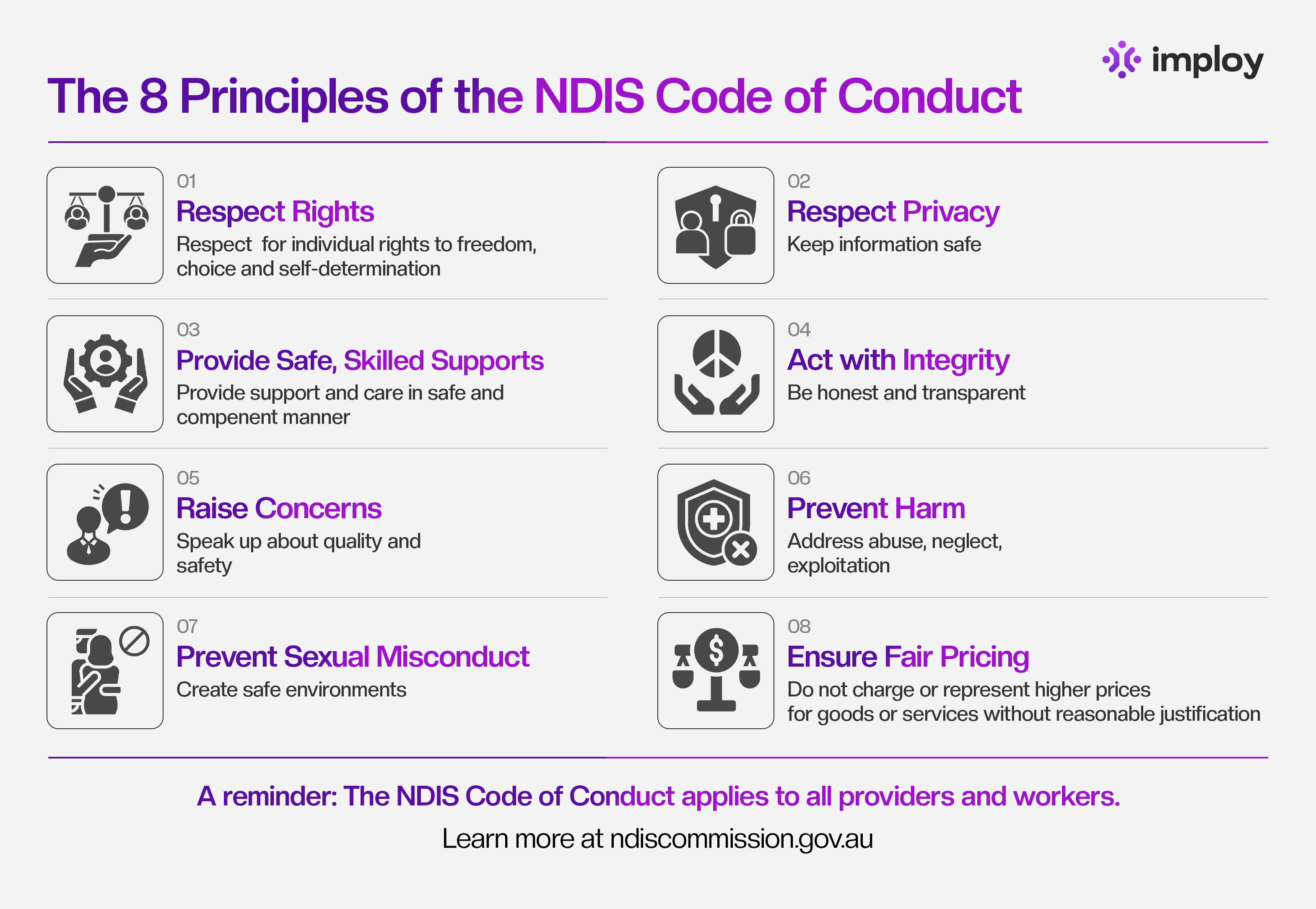NDIS Code of Conduct: Ensuring Compliance and Safety
Explore the NDIS Code of Conduct and learn how providers can comply, protect participant rights, prevent abuse, and embed safety and integrity in everyday disability support.

The NDIS Code of Conduct is more than just a set of rules, it’s the foundation for a safe, respectful, and high-quality disability support environment. It sets the behavioural standards that every NDIS provider and worker must follow to ensure participants are treated with dignity, respect, and fairness.
In this blog, we’ll unpack what the NDIS Code of Conduct is, who must comply, why it matters, and how you can embed it into your organisation’s culture and everyday practice.
What is the NDIS Code of Conduct?
The NDIS Code of Conduct outlines the minimum standards of behaviour expected from all workers and providers delivering NDIS supports and services.
It ensures that participants receive services that are safe, ethical, and respectful - protecting their rights to choice, control, and independence.

Under the Code, NDIS providers and workers must:
1. Act with respect for individual rights to freedom of expression, self-determination, and decision-making
Every person with a disability has the right to make their own choices about their life and support.
Providers and workers must:
- Respect participants’ preferences and goals even if they differ from what the worker might choose.
- Encourage independence and participation in decision-making.
- Avoid pressuring or influencing participants to act against their wishes.
Example: Allowing a participant to choose their support worker, daily activities, or how they receive personal care.
2. Respect privacy and confidentiality at all times
Participants trust workers with sensitive personal, medical, and financial information.
Providers must:
- Store records securely and share information only with authorised people.
- Discuss participant details privately and only when necessary for care delivery.
Example: Never discussing participant information in public places or on social media.
3. Deliver services safely and competently, with care and skill
Support should always be provided safely and to a professional standard.
This means:
- Workers are trained, qualified, and competent in their roles.
- Services meet the participant’s individual needs without causing harm.
- Providers maintain systems to supervise and support staff.
Example: Ensuring manual handling techniques are used correctly to prevent injury.
4. Act with integrity, honesty, and transparency
Ethical behaviour builds trust between providers, participants, and the community.
Providers and workers must:
- Be open and truthful in all interactions.
- Avoid conflicts of interest or misuse of participant funds.
- Clearly communicate service agreements, pricing, and responsibilities.
Example: Being honest about service availability or delays, rather than overpromising.
5. Raise and act on concerns that may affect the quality and safety of supports
Every worker has a duty to speak up if something isn’t right.
This includes:
- Reporting incidents, unsafe practices, or suspected abuse.
- Following your organisation’s incident management and complaints process.
- Encouraging a workplace culture where raising concerns is safe and supported.
Example: Reporting a co-worker who regularly ignores a participant’s care plan or safety needs.
6. Prevent and respond to violence, exploitation, neglect, and abuse
Workers must take proactive steps to protect participants from harm.
Providers should:
- Identify and manage risks to participants’ safety.
- Train staff on recognising and responding to signs of abuse or neglect.
- Support participants to speak up if they feel unsafe.
Example: Taking immediate action if a participant reports financial exploitation or physical harm.
7. Prevent and respond to sexual misconduct
All participants deserve to feel safe and respected in every interaction.
Providers and workers must:
- Never engage in any form of sexual activity or inappropriate behaviour with participants.
- Maintain professional boundaries at all times.
- Report any suspected or observed misconduct immediately.
Example: A support worker must not make personal advances, comments, or gestures toward a participant.
8. Ensure fair pricing, avoiding unreasonable or unjustified costs to participants
Participants should always be charged fairly for services and goods.
Providers must:
- Charge only for agreed support at NDIS-approved rates.
- Avoid adding unnecessary fees or inflated costs.
- Clearly explain pricing in service agreements and invoices.
Example: Not charging higher prices for mobility aids or supplies unless there’s a documented, reasonable justification (e.g., urgent delivery or specialised item).
These principles apply across all levels of service delivery - from frontline workers to senior management.
Who Must Follow the Code?
The Code of Conduct applies to everyone involved in delivering NDIS supports, including:
- Registered NDIS providers and their key personnel.
- Unregistered NDIS providers who deliver funded support or services.
- NDIS workers, whether casual, part-time, or contractors.
- Providers delivering Information, Linkages and Capacity-Building (ILC) activities.
- Providers under the Commonwealth Continuity of Support Programme for older people.
This broad coverage ensures that participants receive the same level of care, safety, and respect - regardless of who delivers their support. You can read the differences between Registered and Unregistered Providers in detail in our blog Registered vs Unregistered NDIS Providers: What’s the Difference?
Why Does Code Matters? : Compliance and Safety
The NDIS Code of Conduct plays a vital role in protecting people with disability and ensuring the integrity of the NDIS sector.
For Participants
Safeguards their rights and wellbeing.
- Promotes dignity, choice, and control.
- Reduces the risk of abuse, neglect, and exploitation.
For Providers
- Builds a culture of integrity, safety, and accountability.
- Ensures compliance with the NDIS Quality and Safeguards Commission.
- Strengthens trust with participants and their families.
- Prevents regulatory action, fines, or loss of registration.
Ultimately, adherence to the Code isn’t just about compliance - it’s about doing the right thing and providing services that genuinely improve lives.
How to Embed the Code in Your Organisation?
Embedding the Code into everyday practice requires leadership, structure, and commitment. Here are key steps to help your organisation stay compliant:
1. Strengthen Policies and Procedures
- Align internal policies with each element of the Code.
- Ensure management systems clearly define responsibilities and reporting lines.
2. Train and Empower Your Workforce
- Make the Worker Orientation Module - Quality, Safety and You mandatory for all staff.
- Regularly review training programs to include topics like ethical conduct, privacy, and participant rights.
3. Promote a Safe and Respectful Culture
- Encourage open communication and feedback.
- Create an environment where workers feel confident to report incidents or concerns.
4. Implement Effective Risk and Incident Management
- Have clear procedures for identifying, reporting, and addressing safety risks.
- Investigate incidents promptly and take corrective action.
5. Review Pricing and Business Practices
- Regularly check pricing structures to ensure fairness and transparency.
- Keep records to justify any additional costs.
6. Continuous Improvement
- Audit compliance regularly.
- Use resources, factsheets, and templates from the NDIS Commission website.
- Monitor training completion, complaints, and participant satisfaction.
Common Challenges and How to Overcome Them
How Imploy Helps Providers Stay Compliant with the NDIS Code of Conduct?
At imploy, we understand that keeping up with NDIS compliance requirements - like the Code of Conduct can feel overwhelming, especially for small or growing providers. That’s why we’ve designed tools, templates, and resources to make compliance simple, transparent, and effective.
Here’s how we can help:
1. Ready-to-Use NDIS Policy and Procedure Templates
Our professionally written templates align with the NDIS Code of Conduct, helping you set clear expectations for staff behaviour, reporting, privacy, and service delivery.
Explore our NDIS Policy and Procedures Templates.
2. Worker Training & Orientation Resources
We provide guidance on essential staff onboarding materials, including links to the official NDIS Worker Orientation Module - Quality, Safety and You, and help you integrate this into your internal induction process.
3. Incident & Risk Management Tools
imploy’s Incident Management and Risk Assessment templates ensure your organisation meets its duty to respond promptly to concerns - a core part of the Code of Conduct.
Try: Incident Management and Report Template.
4. Continuous Improvement Support
We help providers embed compliance into everyday operations through easy-to-follow documentation, audits, and self-assessment tools, making it easier to demonstrate accountability during audits or reviews.
5. Practical Guidance & Updates
Through our blogs, guides, and compliance updates, imploy keeps you informed about key NDIS changes, helping you adapt quickly and confidently.
Key Takeaways
- The NDIS Code of Conduct ensures all providers and workers uphold the rights, safety, and wellbeing of participants.
- Compliance is a shared responsibility across every level of service delivery.
- Embedding the Code means creating a workplace culture of respect, integrity, and accountability.
- Continuous improvement and staff education are key to maintaining compliance.
Conclusion
The NDIS Code of Conduct is more than a regulatory requirement, it’s a commitment to safe, high-quality, and person-centred care.
By understanding and applying the Code in daily practice, your organisation not only meets compliance obligations but also builds trust and delivers better outcomes for people with disability.
To learn more, visit the official NDIS Code of Conduct page on the NDIS Commission website
FAQs
1. What is the purpose of the NDIS Code of Conduct?
The Code of Conduct sets minimum behavioural standards for all NDIS workers and providers. Its main goal is to ensure participants receive safe, respectful, and high-quality services while protecting their rights, choice, and independence.
2. Who must comply with the Code of Conduct?
The Code applies to:
- Registered and unregistered NDIS providers delivering funded support.
- Key personnel of registered providers.
- All NDIS workers (full-time, part-time, casual, and contractors).
- Providers delivering Information, Linkages, and Capacity-Building (ILC) activities.
- Providers under the Commonwealth Continuity of Support Programme for older people.
3. What happens if a worker or provider breaches the Code?
Breaches may lead to:
- Investigation by the NDIS Quality and Safeguards Commission.
- Enforcement actions, including fines, conditions on registration, or suspension.
- Damage to reputation and trust with participants.
4. Are casual or temporary workers required to follow the Code?
Yes. All NDIS workers, regardless of employment type, must comply with the Code when delivering support and services.
5. How can imploy support providers in staying compliant?
imploy offers:
- Ready-to-use policy and procedure templates aligned with the Code.
- Staff training and onboarding guidance.
- Incident and risk management templates.
- Continuous improvement tools and compliance resources.




